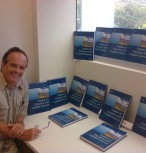DNA reveals the past and future of coral reefs
New DNA techniques are being used to understand how coral reacted to the end of the last ice age in order to better predict how they will cope with current changes to the climate. James Cook Univer

From 2005 to 2022, the main node of the ARC Centre of Excellence for Coral Reef Studies was headquartered at James Cook University in Townsville, Queensland (Australia)








Abstract: Physical oceanographers have made a significant contribution to understand and quantify the water currents and the diffusion processes that help control the transport of propagules and larvae. This understanding by itself does generally not satisfactorily explain the observed self-seeding and connectivity of marine populations. A more realistic understanding results when the passive and active behaviour of the seeds, propagules, larvae, hatchlings and juveniles are taken into account. I will summarise and provide a synthesis of recent advances through field, genetic and model studies of the self-recruitment and connectivity of jellyfish in marine lakes, corals in acidified bays, seagrass in Torres Strait, mangrove propagules, mussels, prawns, some estuarine fish, sea turtles in the GBR, the copepod Calanus finmarchius in the North Sea, and the ornate spiny lobster P. ornatus from Torres Strait to Vietnam.
Biography: Eric Wolanski is an estuarine and coastal oceanographer at James Cook University. His research focuses on the interaction between physical and biological processes determining ecosystem health in estuaries, coastal wetlands, and coral reefs. He has 380 publications including the books “Physical Oceanographic Processes of the Great Barrier Reef”, “Oceanographic processes of coral reefs: Physical and biological links in the Great Barrier Reef”, “Coastal Wetlands. An integrated ecosystem approach”, “Estuaries of Australia in 2050 and beyond”, and “Estuarine Ecohydrology. An Introduction”. Eric is a Fellow of the Australian Academy of Technological Sciences and Engineering and l’Académie Royale des Sciences d’Outre-Mer. He was awarded a Doctorate Honoris Causa by the catholic University of Louvain, and a Lifetime Achievement Award by ECSA. He is a member of the ARC College of Experts, ACSRF, and of the Scientific and Policy Committee of EMECS.
New DNA techniques are being used to understand how coral reacted to the end of the last ice age in order to better predict how they will cope with current changes to the climate. James Cook Univer
A new study on the effects of climate change in five tropical countries has found fisheries are in more trouble than agriculture, and poor people are in the most danger. Distinguished Profess
James Cook University researchers have found brightly coloured fish are becoming increasingly rare as coral declines, with the phenomenon likely to get worse in the future. Christopher Hemingson, a
Researchers working with stakeholders in the Great Barrier Reef region have come up with ideas on how groups responsible for looking after the reef can operate more effectively when the next bleaching
Abstract: As marine species adapt to climate change, their heat tolerance will likely be under strong selection. Individual variation in heat tolerance and its heritability underpin the potential fo
Abstract: The Reef Ecology Lab in KAUST’s Red Sea Research Center explores many aspects of movement ecology of marine organisms, ranging from adult migrations to intergenerational larval dispersal
Abstract: Macroalgal meadows are a prominent, yet often maligned component of the tropical seascape. Our work at Ningaloo reef in WA demonstrate that canopy forming macroalgae provide habitat for ad
Abstract: Sharks are generally perceived as strong and fearsome animals. With fossils dating back at least 420 million years, sharks are not only majestic top predators but they also outlived dinosa
Abstract: Connectivity plays a vital role in many ecosystems through its effects on fundamental ecological and evolutionary processes. Its consequences for populations and metapopulations have been
Abstract: Evolution of many eukaryotic organisms is affected by interactions with microbes. Microbial symbioses can ultimately reflect host’s diet, habitat range, and even body shape. However, how
Abstract: The past few years have seen unprecedented coral bleaching and mortality on the Great Barrier Reef (GBR) but the consequences of this on biodiversity are not yet known. This talk will expl